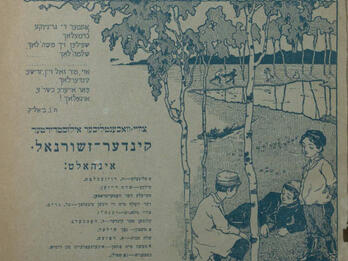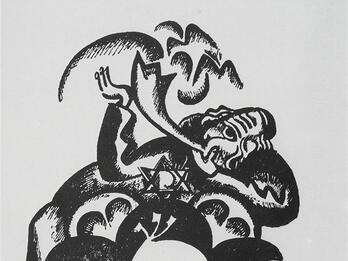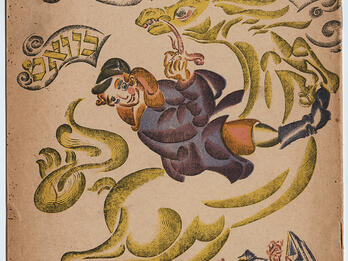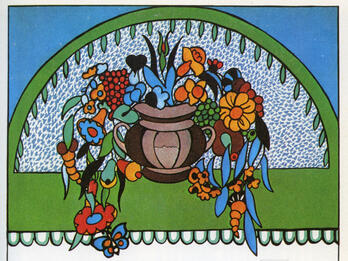The Fountain of Judah (Three Stories)
Hillel and His Teachers
Hillel the Babylonian, the important teacher of Israel, was poor and needy, and his daily income consisted of half a zuz. One half of this he used for food, the other half he gave to the guard of the study house where the masters Shemaya and Avtalyon were teaching, so that he would allow him to listen to the words of wisdom and divine revelation that issued from their mouths.
One day, in winter, Hillel did not have a gift for the guard, and therefore was not allowed to enter the study house. So Hillel climbed onto the roof and leaned with his head against the window of the hall to listen to the lecture of the teachers. On that day a thick snow fell and the pious man was entirely covered by the flakes; but he did not notice it because he was parched for the sounds of teaching. When evening fell, he was so cold that he was unable to get up and remained lying on the window.
In the morning the teachers Shemaya and Avtalyon entered the study house and found that the room was dark. They looked up to the window that usually admitted the light and saw that it was covered. They searched the area and found Hillel lying there as one dead. They removed his garments, wrapped him in dry cloths and lit fires around him so that his spirit returned. From that day on, they allowed him to visit their study house without payment.
Beruria the Courageous
It is told:
One Shabbat afternoon, the pious R. Meir sat in the study house; in the meantime his two sons died. What did their mother Beruria do? She laid the children on a bed and covered them with a sheet.
When Shabbat came to a close, R. Meir returned home and asked: Where are my children? Beruria replied: They went to the study house. R. Meir said: I looked around the study house and did not see them. The cup of wine was held out to him so that he could say the blessing over the transition from Shabbat to the regular week, and he said the blessing. Then he asked again: Where are my two sons? The woman replied: They went out and will soon return. And she put nourishment before her husband, and he ate and blessed the Creator. After he had made the blessing, Beruria spoke: My Lord, I want to ask you a question. R. Meir replied: Surely, do ask. She said: my Lord, a man came and gave me a pledge for safekeeping, and now he is coming to reclaim it. Should we return it to him or nor? R. Meir replied: Daughter, whoever accepts a pledge, must return it to its owner. Beruria said: “Lord, if it were not your will, I would not return it.”
What did she do afterwards? She took her husband by the hand, led him into the room where the children were lying, guided him to the bed, and removed the cloth. Then the pious one saw his sons lying stretched out and dead. He began to weep and to cry: You, my offspring, my teachers! You were my children by birth and my teachers by your wisdom. In this hour Beruria spoke to Meir: My Lord, did you not just say that one has to return goods to their owner? Then the pious one spoke as Job had spoken: The Lord gave and the Lord has taken away, blessed be the name of the Lord (Job 1:21).
The Three Brothers
A pious man felt death approaching. He called his three sons and ordered them not to fight with each other so that they would not be forced to swear an oath; he himself had never uttered an oath in his entire life.
After the man had died, he left a spice garden and the sons were supposed to protect it from thieves. The first night the oldest son slept in the garden. The prophet Elijah came to him and asked: What gives you pleasure, my son? Do you want to be well versed in scripture, or do you want to have a lot of money, or do you want to marry a beautiful woman? The son replied: I want great riches. So Elijah gave him a coin and it enabled the young man to gain a great fortune.
The second night the second son slept in the garden, and Elijah asked him the same three questions. The boy replied: I would like to study the Law. So Elijah gave him a book and it enabled him to get to know all of Scripture.
The third night the youngest son slept in the garden and Elijah asked him what his heart desired. He replied: “I would like to possess a beautiful wife.” In that case, said Elijah, you must travel with me. And they set out together. When night fell, they stayed with a wicked innkeeper. Elijah heard the chickens and geese talk to each other: What can the boy possibly be guilty of to be given the daughter of our landlord for a wife? Elijah heard it, understood the meaning of their words and traveled on.
The following night they stayed at another house, and again Elijah heard the chickens and the geese converse: What sin can the youth possibly have committed that he is to be given the daughter of our landlord for a wife? They are all godless. Elijah roused the boy early and they left.
The third night they came to a house whose landlord had a beautiful daughter. There, too, Elijah heard the chickens and geese cackle. But they said: The youth must have great merit to be awarded such a beautiful God-fearing wife. In the morning, Elijah got up early, brought the two together and celebrated the wedding. Afterwards the couple returned home in peace.
God granted all of that to the youth because he had observed his father’s commandment.
Credits
Published in: The Posen Library of Jewish Culture and Civilization, vol. 7.






